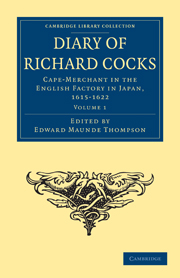PREFACE
Published online by Cambridge University Press: 05 October 2010
Summary
The history of the English trading settlement in Japan in the first quarter of the seventeenth century is the history of a failure; and the causes of the failure are not far to seek. Choosing for their depot an insignificant island in the extreme west of the kingdom, without even good anchorage to recommend it, and at a far distance from the capital cities of Miako and Yedo, with the Dutch for their neighbours and, as it proved, their rivals, the English may be said to have courted disaster. It is true that Firando was a ready port for shipping coming from Europe; its ruler was friendly; and it lay in a convenient position from whence to open the muchdesired trade with China. And the policy of making common cause with the Protestant Hollanders against the Spaniards and Portuguese, who had first secured a footing in Japan and were powerful in the neighbouring town of Nagasaki, would have been a sound one, had the latter remained supreme. But, when the English landed, the Dutch had already obtained privileges and had established their trade in the country; and what ought to have been foreseen inevitably came to pass. The Dutch were not allies; they were rivals, who undersold the English in the market and in the end starved them out of the country.
- Type
- Chapter
- Information
- Diary of Richard Cocks, Cape-Merchant in the English Factory in Japan, 1615–1622With Correspondence, pp. iii - liiPublisher: Cambridge University PressPrint publication year: 2010First published in: 1883

